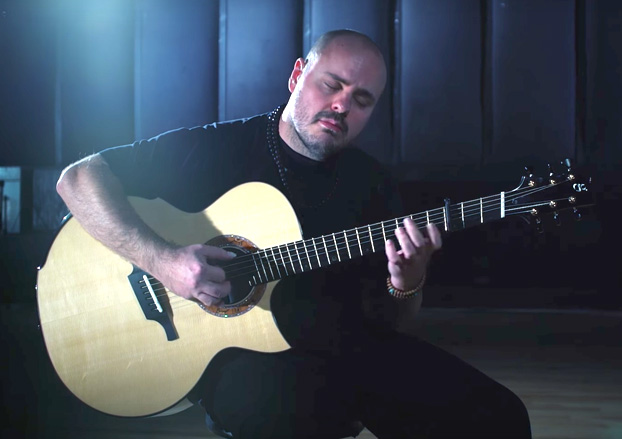Andy McKee: Five Things We Learned from His Ernie Ball 'String Theory' Episode

Acoustic guitarist Andy McKee is the subject of Ernie Ball’s latest episode of String Theory, a web series exploring the sonic origins of some of music’s most influential and innovative guitar players.
Here are five surprising facts revealed in the episode:
1. Seeing Preston Reed and Michael Hedges transformed his view of the acoustic guitar (0:15): “There’s nothing like the first time, when I saw Preston Reed when I was 16—or when I heard Michael Hedges a year later. I just had never seen anything like it in my life. I thought the acoustic guitar was, you know, G, C and D, strumming along and singing campfire songs, whatever. He was playing guitar in a way I’d never seen before, with his left hand over the top of the neck, and hitting the guitar body for different drum sounds. He totally blew my mind that night.”
2. Eric Johnson’s “Cliffs of Dover” made him fall in love with guitar (0 :57): “I didn’t get into actually playing the guitar until I was 13. I heard Eric Johnson on the radio. He was doing “Cliffs of Dover” at that time, it was the early Nineties. I heard that tune, and just really fell in love with the guitar at that point.”
3. His writing process is heavily inspired by alternate tunings (1:43): “When I’m writing music, usually what happens is I’ll come up with a new tuning, and begin to experiment. All of the chord shapes that you know are thrown out. All the scale patterns you’ve memorized and played a million times are thrown out. It’s kind of counterintuitive, but you’re just forced to think in a different way.”
4. Being a genuine and honest person is part of his musicality (4:45): “This way of playing guitar as a soloist—you can’t really fake anything up there. You have to be a genuine sort of person for people to connect with it, I think, and to be able to express yourself the right way. Maybe that relates in a way to the way that I was raised by my parents, just being an honest person, trying to be friendly and helpful—all that kind of Midwest stuff, you know—maybe it ties into it, maybe it doesn’t. I do try and put myself into my music though, in a very honest way. And I think the acoustic guitar helps me do that.”
5. He describes playing live as being like a meditation (7:02): “During the show, that sort of connection that you have on stage performing live—there’s nothing else quite like it. For me, it’s strange to say maybe, but it’s kind of like a mediation in a way. I’ll often close my eyes and just try to hear the music, and express it in the best way that I can.”
Get The Pick Newsletter
All the latest guitar news, interviews, lessons, reviews, deals and more, direct to your inbox!
Of course, these are just five facts pulled from the clip. Be sure to watch the entire episode below.
For more information, visit ernieball.com.
Since 1980, Guitar World has been the ultimate resource for guitarists. Whether you want to learn the techniques employed by your guitar heroes, read about their latest projects or simply need to know which guitar is the right one to buy, Guitar World is the place to look.
“Even the thought that Clapton might have seen a few seconds of my video feels surreal. But I’m truly honored”: Eric Clapton names Japanese neo-soul guitarist as one to watch
“You better be ready to prove it’s something you can do”: Giacomo Turra got exposed – but real guitar virtuosos are being wrongly accused of fakery, too











